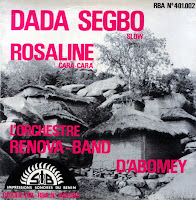With all due respect I have for Stanislas Tohon, he crossed a barrier on this album I can not enjoy, that of drum machines. However we find the soul and the spirit of "Tchink System"'s king. I confess I like this record.
Avec tout le respect que j'ai pour Stanislas Tohon, il franchit une barrière que j'ai du mal à apprécier, celle des boites à rythmes. On retrouve néanmoins l'âme et l'esprit du roi du "Tchink System". J'avoue j'aime ce disque.
















